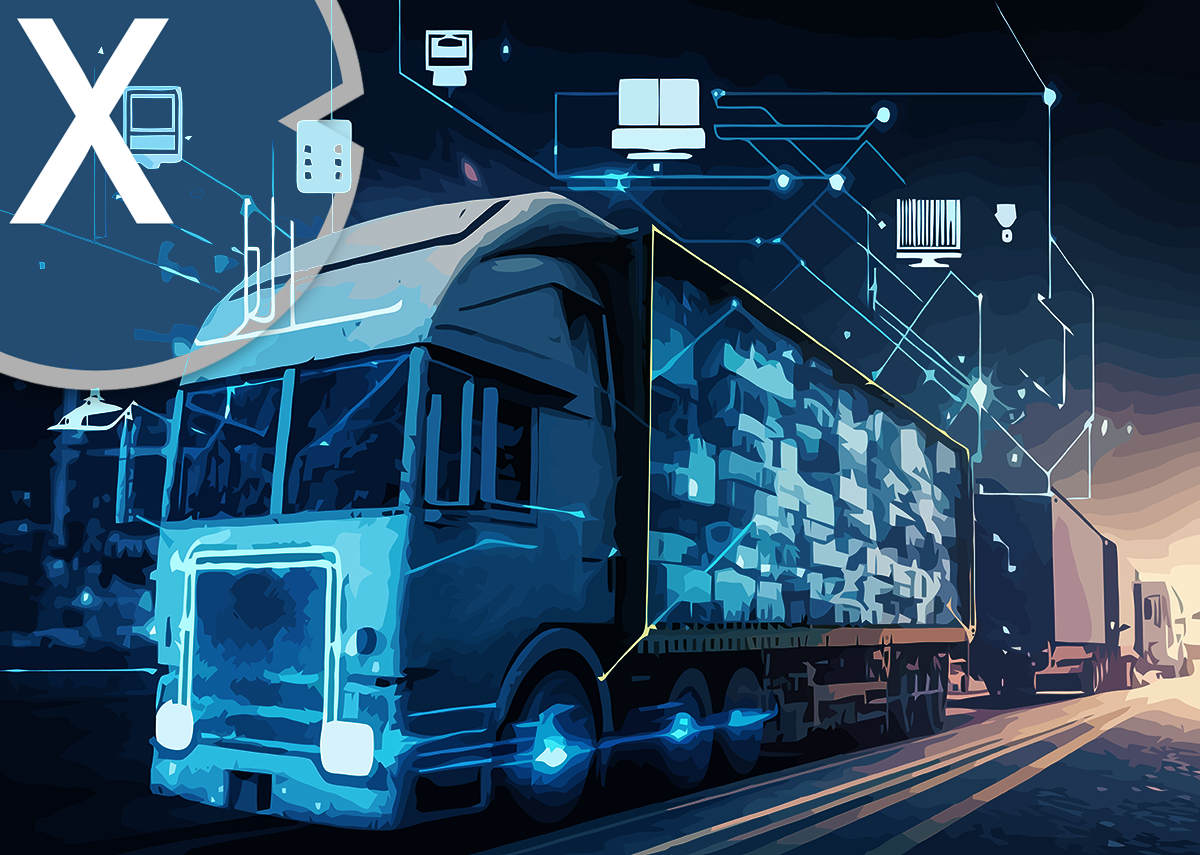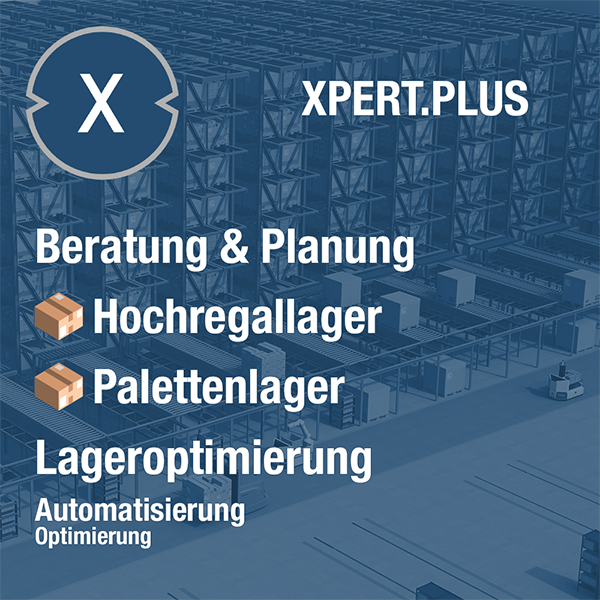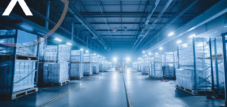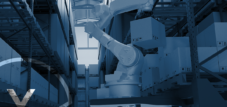Industry 4.0 logistics equipment with digitized logistics systems and intelligent or smart logistics solutions
Language selection 📢
Published on: June 21, 2023 / update from: June 21, 2023 - Author: Konrad Wolfenstein

The future of logistics: Industry 4.0 logistics equipment for efficient, connected and intelligent solutions – Image: Xpert.Digital / GogOfVector|Shutterstock.com
Modern logistics equipment for Industry 4.0: The integration of digital logistics systems and intelligent solutions
Industry 4.0 logistics equipment with digitalized logistics systems and intelligent or smart logistics solutions are on the rise and are revolutionizing the way logistics processes are carried out in companies. These equipment and solutions use cutting-edge technologies and concepts to improve efficiency, productivity and traceability in logistics.
Digitalized logistics systems
By integrating sensors, data analysis and networked communication, digitalized logistics systems enable real-time monitoring and control of logistical processes. They offer comprehensive transparency across the entire supply chain and enable precise planning, tracking and optimization of the flow of goods.
Automation and robotics
Industry 4.0 logistics equipment is increasingly relying on automated and robot-controlled solutions. This includes, for example, automatic order picking systems, robot systems for loading and unloading goods and automated guided vehicle systems (AGVs). Automating repetitive tasks increases efficiency and minimizes human errors.
Internet of Things (IoT)
IoT technologies enable the networking and communication of devices, machines and systems in logistics. Sensors and smart devices can collect and exchange information about the condition of goods, inventory levels, transportation conditions, etc. This allows real-time data to be used to make decisions, identify bottlenecks and optimize efficiency.
Artificial intelligence (AI) and machine learning
By using AI and machine learning, Industry 4.0 logistics equipment can recognize patterns and connections in the collected data and derive insights from them. This enables more precise forecasting of demand, inventory management and route optimization.
Smart warehouse management systems
Intelligent warehouse management systems use advanced algorithms and data analytics to efficiently manage inventory, optimize picking processes and avoid bottlenecks. They enable precise inventory, optimized storage space utilization and improved traceability of goods.
sustainability
Industry 4.0 logistics equipment also supports sustainable logistics practices. Through optimized route planning and better utilization of means of transport, emissions can be reduced and resources can be used more efficiently. Digital systems also enable better monitoring of energy consumption and environmental impacts.
Improved customer support
By integrating digital solutions into logistics, companies can provide better customer service. Real-time tracking and notifications allow customers to track the status of their orders and receive accurate delivery times.
Predictive maintenance
Predictive maintenance: Industry 4.0 logistics equipment uses predictive maintenance to monitor the condition of machines and devices. By continuously collecting and analyzing data, potential problems can be identified at an early stage. This enables predictive maintenance, where maintenance work is scheduled before failures occur. This minimizes unplanned downtime and optimizes operating time.
Efficient use of resources
By using intelligent logistics equipment, companies can use their resources more efficiently. This includes optimizing storage space and layout, avoiding excess stock, reducing empty trips during transport and efficiently utilizing vehicles and machines. This leads to cost savings and sustainable resource management.
Flexibility and scalability
Industry 4.0 logistics equipment offers companies the flexibility and scalability to adapt to changing market requirements. Through digital networking and automation, processes can be adapted efficiently and responded to new requirements. Companies can quickly expand or adapt their logistics infrastructure to respond to increased order volumes or changing production conditions.
Supply chain optimization
Industry 4.0 logistics equipment helps optimize the entire supply chain. By integrating data from various sources such as suppliers, production facilities and logistics systems, they enable improved planning, coordination and monitoring along the entire value chain. This results in reduced lead times, optimized inventory levels and greater agility in the supply chain.
Improved data transparency and analysis
Industry 4.0 logistics equipment offers companies improved data transparency and analysis. By collecting and analyzing large amounts of data, companies can gain insights to further optimize their processes. Real-time dashboards and reports provide important information on metrics such as inventory levels, delivery times, order status and costs. This enables well-founded decisions and continuous improvement of logistics processes.
➡️ Industry 4.0 logistics equipment offers numerous benefits for companies, including increased efficiency, cost savings, improved traceability and optimized customer support. By using digitalized logistics systems and intelligent solutions, companies can increase their competitiveness and assert themselves in the dynamic market environment.

Xpert.Plus warehouse optimization - high-bay warehouses such as pallet warehouses consulting and planning
What exactly is the smart logistics equipment industry all about?
The intelligent logistics equipment industry is about developing and deploying technologies, devices and systems that make logistics and supply chain processes more efficient and automated. The goal is to optimize the entire logistical process, minimize errors, reduce costs and increase productivity.
Automated material and goods flow systems
These are systems that automate the transport of goods and materials within a warehouse or production facility. This can be done through the use of conveyor belts, storage and retrieval machines, robots or autonomous vehicles.
Warehouse management systems (LVS)
LVS are software solutions that control and monitor entire warehouse operations. They optimize the use of storage space, manage inventory, control incoming and outgoing goods and enable precise inventory management.
Tracking and identification systems
By using RFID tags, barcodes or other identification methods, products and goods can be tracked and located throughout the entire logistics process. This enables improved transparency and traceability.
Artificial intelligence and data analysis
Smart logistics equipment uses advanced algorithms and data analysis techniques to process large amounts of logistics data and generate valuable insights. This allows bottlenecks to be identified, processes optimized and preventive maintenance to be carried out.
Internet of Things (IoT)
Connecting devices and sensors enables seamless communication and data exchange. This enables real-time monitoring, remote maintenance and the integration of logistics systems.
➡️ The intelligent logistics equipment aims to make the entire logistics process more efficient, faster and more precise. It helps reduce storage costs, improve delivery times, optimize inventory management and increase customer satisfaction. By using state-of-the-art technologies and automation solutions, companies in the intelligent logistics equipment industry can increase their competitiveness and face the challenges of a globalized and demanding logistics landscape.
Intelligent logistics solutions
Smart logistics solutions with smart logistics equipment refer to the use of technology, data analysis and automation to improve efficiency, transparency and control in logistics. These solutions leverage advanced technologies such as the Internet of Things (IoT), artificial intelligence (AI) and machine learning to optimize the entire logistics process.
Real-time tracking and monitoring
By integrating sensors and IoT devices into logistics equipment such as vehicles, containers or pallets, companies can track and monitor the location and condition of goods in real time. This enables precise delivery tracking, better planning and optimization of routes, and effective response to unforeseen events.
Automated warehouse management systems
Smart logistics equipment also includes automated warehouse management systems such as automated storage and retrieval machines, sorting systems and order picking robots. These systems optimize warehousing, minimize manual intervention and speed up the picking process, resulting in improved efficiency and accuracy.
Data analysis and prediction
Smart logistics solutions use advanced data analysis techniques to gain valuable insights from the data collected. By analyzing data on delivery times, inventory, demand, and other relevant factors, companies can create accurate forecasts, avoid shortages, optimize inventory planning, and improve supply chain efficiency.
Collaborative platforms
Smart logistics solutions promote collaboration and information sharing between different actors in the supply chain. Collaborative platforms enable companies to communicate in real-time with suppliers, carriers and customers to coordinate deliveries, manage shortages and improve customer service.
Optimization of transport routes
Smart logistics equipment uses data and algorithms to calculate the most efficient transport routes. By considering factors such as traffic conditions, weather conditions and delivery priorities, companies can reduce costs, shorten delivery times and reduce environmental impact.
Automated documentation and compliance
Intelligent logistics solutions simplify documentation and compliance with compliance requirements. Automating records, customs documents and other required documents increases efficiency and reduces errors.
➡️ Smart logistics solutions aim to optimize the entire logistics process, from warehousing to transportation and delivery. They enable better planning, increase efficiency, reduce costs and improve customer service by making decisions based on data and technology.
Smart logistics equipment
Digitalized logistics systems with intelligent logistics equipment refer to the transition from traditional, paper-based processes to digital technologies to control and optimize logistics activities. These systems use modern technologies such as the Internet of Things (IoT), cloud computing, artificial intelligence (AI) and data analytics to make the entire logistics process more efficient, transparent and scalable.
Real-time data collection
Through the use of sensors, IoT devices and smart logistics equipment, real-time data is collected on various aspects of logistics, such as location, temperature, condition of goods, inventory levels and vehicle performance. This data allows accurate and immediate monitoring of the logistic process.
Connectivity and integration
Digital logistics systems enable the seamless integration of data and information across different stations and partners along the supply chain. This facilitates communication, collaboration and information exchange between those involved and helps increase efficiency.
Automation and optimization
By using automation technologies such as robots and automation systems, logistical tasks and processes are optimized. This includes automated warehouse management systems, order picking systems, transportation planning and optimization, and automated data collection and analysis. Automation reduces manual intervention, minimizes errors and improves efficiency.
Data analysis and forecasting
Digital logistics systems use advanced data analysis techniques to gain valuable insights from the data collected. By analyzing historical data and real-time information, companies can identify trends, make predictions, identify bottlenecks and make informed decisions to optimize logistics performance.
Transparency and traceability
Digitalized logistics systems offer a high level of transparency and traceability along the supply chain. Companies can track the status of shipments, inventory and transportation in real time and provide accurate information to customers and other stakeholders. This improves customer satisfaction, increases trust and enables effective troubleshooting.
Optimization of resource utilization
By digitally monitoring and analyzing data, companies can optimize resource utilization, such as inventory levels, vehicle utilization, and route planning. This leads to efficient use of resources, reduction in costs and environmental impact.
➡️ Digital logistics systems play a crucial role in improving efficiency, transparency and sustainability in the supply chain. They enable companies to respond quickly to changes, improve customer service and remain competitive.
Intelligent or smart Industry 4.0 logistics solutions
Intelligent or smart Industry 4.0 logistics solutions refer to the use of advanced technologies and digital innovations in logistics to increase efficiency, productivity and transparency. These solutions leverage the concept of connected systems and intelligent machines to optimize the entire logistics process and enable seamless communication and collaboration between the different actors in the supply chain.
Automation and robotics
Smart logistics solutions use robotics and automation technologies to automate repetitive and time-consuming tasks. This includes automated warehouse management systems, self-driving vehicles and robotic picking that increase efficiency and reduce errors.
Internet of Things (IoT)
By integrating IoT devices and sensors into logistics equipment and infrastructure, real-time data about the condition of goods, inventory levels, location of deliveries and much more can be collected and monitored. This enables better inventory management, accurate delivery tracking and effective response to changes in real time.
Data analysis and artificial intelligence (AI)
Smart logistics solutions use advanced data analysis techniques and AI algorithms to gain valuable insights from the data collected. By analyzing data, bottlenecks can be identified, predictions can be made and decisions can be optimized to improve logistics processes and avoid bottlenecks.
Networked systems and real-time communication
Smart logistics solutions enable seamless communication and collaboration between different actors in the supply chain. Connected systems allow information to be shared in real time, leading to better coordination, planning and response to changes.
Efficient route planning and optimization
Smart logistics solutions use algorithms and real-time data to calculate the most efficient routes for transporting goods. This helps reduce costs, shorten delivery times and reduce environmental impact.
Transparency and traceability
Intelligent logistics solutions offer a high level of transparency and traceability along the supply chain. Customers and companies can track the status of their shipments in real time and receive accurate information about their whereabouts and delivery.
➡️ By using intelligent or smart Industry 4.0 logistics solutions, companies can optimize their logistics processes, reduce costs, increase productivity and gain a competitive advantage
Digitized / digital logistics systems and smart logistics equipment
Digitalized logistics systems and smart logistics equipment refer to the use of digital technologies and intelligent devices to improve efficiency, accuracy and transparency in logistics. These systems and equipment use modern technologies such as the Internet of Things (IoT), artificial intelligence (AI), data analysis and automation to optimize the entire logistics process.
Digital logistics systems involve the integration of IT systems, software and platforms to improve the flow of information and enable seamless communication between the different actors along the supply chain. They automate and digitize logistical processes, including order fulfillment, warehouse management, inventory management, transportation planning and tracking. By centrally managing and monitoring data, companies can use real-time information to make informed decisions, identify bottlenecks and minimize supply chain risks.
Smart logistics equipment includes intelligent devices, machines and robots equipped with sensors, connectivity and data analysis capabilities. They can work autonomously or semi-autonomously and carry out tasks such as storage, picking, loading and transport. These equipment use advanced technologies to increase productivity, reduce errors and improve safety. They can include, for example, automatic stackers, driverless transport systems, intelligent shelves and robotic order pickers.
The advantages of digitalized logistics systems and smart logistics equipment are diverse:
- Increased efficiency: By automating and digitizing processes, companies can reduce time and effort, increase productivity and minimize bottlenecks.
- Accuracy and error reduction: Intelligent technologies enable precise data processing and analysis, resulting in reduced errors and improved data accuracy.
- Real-time monitoring and control: Digitalized systems provide real-time information about the status of goods, inventory and deliveries, resulting in better control and quick response to changes.
- Transparency and traceability: By integrating track and trace technologies, companies and customers can track the location and status of shipments, resulting in greater transparency and trust.
- Optimizing warehouse management: Digital systems enable better inventory management, optimized storage space utilization and efficient picking, resulting in cost savings and faster order fulfillment.
- Improved safety: Smart logistics equipment can be equipped with safety features such as automatic emergency stop systems and collaborative robots to prevent accidents and injuries.
- Data-driven decision making: By analyzing logistics data, companies can gain insights, identify bottlenecks, and make informed decisions to increase efficiency and profitability.
- Sustainability: Digital and smart solutions support environmental friendliness by optimizing energy consumption, reducing empty trips and enabling efficient route planning.
- Flexibility and adaptability: Digitalized logistics systems enable flexible adaptation to changing requirements and the integration of new technologies to keep pace with the evolving market.
- Competitive advantage: Companies that use digital logistics systems and smart equipment can increase efficiency, optimize their supply chain and gain a competitive advantage by offering faster, more reliable and customer-focused services.
➡️ By implementing digitalized logistics systems and smart logistics equipment, companies can increase the efficiency, accuracy and transparency of their logistics processes, thereby improving their competitiveness in an increasingly digitalized world.
Logistics/Intralogistics 4.0 logistics equipment
Logistics/Intralogistics 4.0 Logistics equipment refers to the use of the latest technologies and concepts in the field of logistics to improve efficiency, productivity and flexibility in internal logistics processes. These equipments use advanced technologies such as Internet of Things (IoT), artificial intelligence (AI), robotics, automation and data analytics to optimize the entire logistics process.
Here are some important features and benefits of Logistics/Intralogistics 4.0 logistics equipment:
Automation and robotics
Logistics 4.0 equipment uses automated machines, automated guided vehicles (AGVs), robotics and robotic arm technology to automate repetitive tasks such as loading and unloading, picking and stacking goods. This increases productivity, reduces errors and enables continuous 24/7 operations.
Networked systems
By integrating IoT sensors and devices into logistics equipment, data can be collected and monitored in real time. This enables optimized control, monitoring and analysis of processes to identify bottlenecks, increase efficiency and improve responsiveness.
Data analysis and AI
Logistics 4.0 equipment collects large amounts of data, which is analyzed using data analytics and AI algorithms. This enables companies to gain insights, predict and make decisions to avoid shortages, optimize utilization and manage inventory.
Flexibility and scalability
Logistics 4.0 equipment is designed to adapt to changing requirements and be scalable. They can be easily adapted to different product sizes, production volumes and operating conditions.
Real-time monitoring and transparency
By connecting logistics equipment with intelligent IT systems and software platforms, companies can track the condition, location and progress of goods in real time. This enables better monitoring, tracking and traceability along the supply chain.
Optimization of resource utilization
Logistics 4.0 equipment helps to use resources such as time, energy and space efficiently. Through automated processes, optimized route planning and effective warehouse management, companies can reduce costs and achieve their sustainability goals.
Occupational safety
By using Logistics 4.0 equipment, dangerous and physically demanding work can be automated or supported, reducing the risk of accidents and injuries. Robots and AGVs can also be equipped with safety features to prevent collisions and ensure workplace safety.
➡️ The integration of Logistics/Intralogistics 4.0 logistics equipment allows companies to optimize their logistical processes, increase efficiency, reduce error rates and improve competitiveness. By using automated, connected and intelligent equipment, companies can manage their supply chain more effectively, respond more quickly to market changes and provide better service to their customers.
Logistics consultant: Use our Xpert.Plus service for your logistics consulting, warehouse planning or warehouse consulting with automation & component solutions
Xpert.Plus is a project from Xpert.Digital. We have many years of experience in supporting and advising on storage solutions and in logistics optimization, which we bundle in a large network Xpert.Plus
I would be happy to serve as your personal advisor.
You can contact me by filling out the contact form below or simply call me on +49 89 89 674 804 (Munich) .
I'm looking forward to our joint project.
Xpert.Digital – Konrad Wolfenstein
Xpert.Digital is a hub for industry with a focus on digitalization, mechanical engineering, logistics/intralogistics and photovoltaics.
With our 360° business development solution, we support well-known companies from new business to after sales.
Market intelligence, smarketing, marketing automation, content development, PR, mail campaigns, personalized social media and lead nurturing are part of our digital tools.
You can find out more at: www.xpert.digital – www.xpert.solar – www.xpert.plus






























